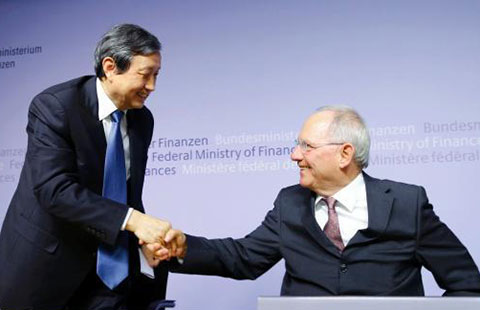Shenzhen in spotlight as China looks to Internet for growth
(Xinhua) Updated: 2015-03-20 15:08SHENZHEN -- When Microsoft planned to resurrect a conference this year with hardware makers after a seven-year hiatus, it settled on the southern Chinese city Shenzhen as the ideal meeting place.
The decision to move the two-day conference from the United States to Shenzhen came as a growing number of Chinese-made PC, tablets and smartphone makers have gained greater sway in the global IT industry over the past seven years. Many of them operate from Shenzhen, a booming town that borders Hong Kong.
"Shenzhen is absolutely the best place for us to host the conference," Terry Myerson, executive vice president for operating systems at Microsoft, told Xinhua in an interview on Wednesday.
"This is about engineers working with engineers, so we brought our engineers here to work directly with companies headquartered in Shenzhen to build great products."
"So much hardware innovation is taking place here."
Several announcements on the latest version of Windows were made by Microsoft's Chinese partners at the conference, held from Wednesday to Thursday.
Lenovo will launch smartphones running Windows 10 sometime this summer while Xiaomi will test the operating system among a group of users on its flagship smartphone Mi4 later this year.
Microsoft will also allow Chinese users to update to the latest version of Windows on their computers through services offered by Chinese internet firms like Tencent and Qihoo 360.
The rise of Microsoft's Shenzhen-based partners like Tencent, Huawei, ZTE have also helped raise the global profile of their breeding ground, which an article from US magazine Inc refers to as the "ground zero for technological serendipity."
"Shenzhen aspires to be the Silicon Valley for hardware makers, a place where accelerators are eager to help you build, test, refine and make a million of something all in the same day," according to the magazine article.
The city breeds the largest number of tech firms listed on the Growth Enterprise Board at the Shenzhen Stock Exchange than any other Chinese cities, and boasts more than 600 public libraries.
Shenzhen also leads among 20 provincial capitals and regional economic powerhouses on the Chinese mainland, excluding Beijing and Shanghai, in areas such as technological sophistication and business environment, according to a study co-authored by China Development Research Foundation and accounting firm PricewaterhouseCoopers, released on Wednesday.
More than half of the city's industrial output in 2013 comes from technological products and research spending accounts for 4 percent of the city's economic output, compared with 2.1 percent for the entire country. These, according to the study, make Shenzhen "the top destination for entrepreneurs".
Shenzhen owes much of its appeal to entrepreneurs to a business-friendly environment. The country's first special economic zone has a tradition of "providing strong support for technological innovation and private entrepreneurship", said the city's former deputy mayor Zhang Hongyi.
And there is strong evidence Chinese authorities wants to replicate Shenzhen's formula to the rest of the country, hoping that a more supportive environment for innovation and entrepreneurship will drive productivity gains for the world's second largest economy, which has slowed to a 24-year-low of 7.4 percent last year.
At this year's annual parliamentary sessions, Chinese Premier Li Keqiang has vowed to nurture entrepreneurship and inspire more innovation through supportive government policies. He challenged the country's traditional sectors to embrace the Internet and cloud computing, among other digital technologies, to boost efficiency and sophistication in a grand vision called "Internet Plus".
"This is all about connecting businesses to a digital agenda," says Ralph Haupter, a Microsoft CEO for the Greater China Region, "Get a piece of hardware, make that intelligent, get digital data and use data to make it better. That's Internet plus and that's how we think of having technology and bring them for innovative work in China."
Half a world away in Hanover, Germany, Chinese tech heavyweights, many of which are from Shenzhen, are staging a commanding presence and showcasing their cutting-edge technologies at the CeBIT technology fair.
In a keynote speech delivered at the opening of the trade fair, Jack Ma, founder of the Chinese e-commerce giant Alibaba, said there has to be a solution for internet and the traditional sectors to work together.
"Internet companies can only survive when mouse and cement are brought together," Ma said, adding that companies in the future will shift their priorities to adaptability and user-friendliness from scale, standards and power.
Back in Shenzhen, that shift has become increasingly evident among Chinese companies Microsoft's Myerson said he had met with.
"When I meet with a team with Huawei, a team with Lenovo, or with Xiaomi, in all those cases, you're looking at that passion to really go and delight customers. That's the core that makes them possible to say 'how are we going to sell it, how are we going to make money doing it'." Myerson said.
- Israel requests to join Asian Infrastructure Investment Bank
- Chinese stocks rebound on April 1
- China, the West in Africa: more room for cooperation than competition
- Nanjing cuts taxi franchise fees
- Air China increases flights to Milan, Paris
- JD.com raises delivery charges
- Veteran corporate strategist upbeat about China economy
- L'Oreal China sales revenue up 7.7% in 2014

















